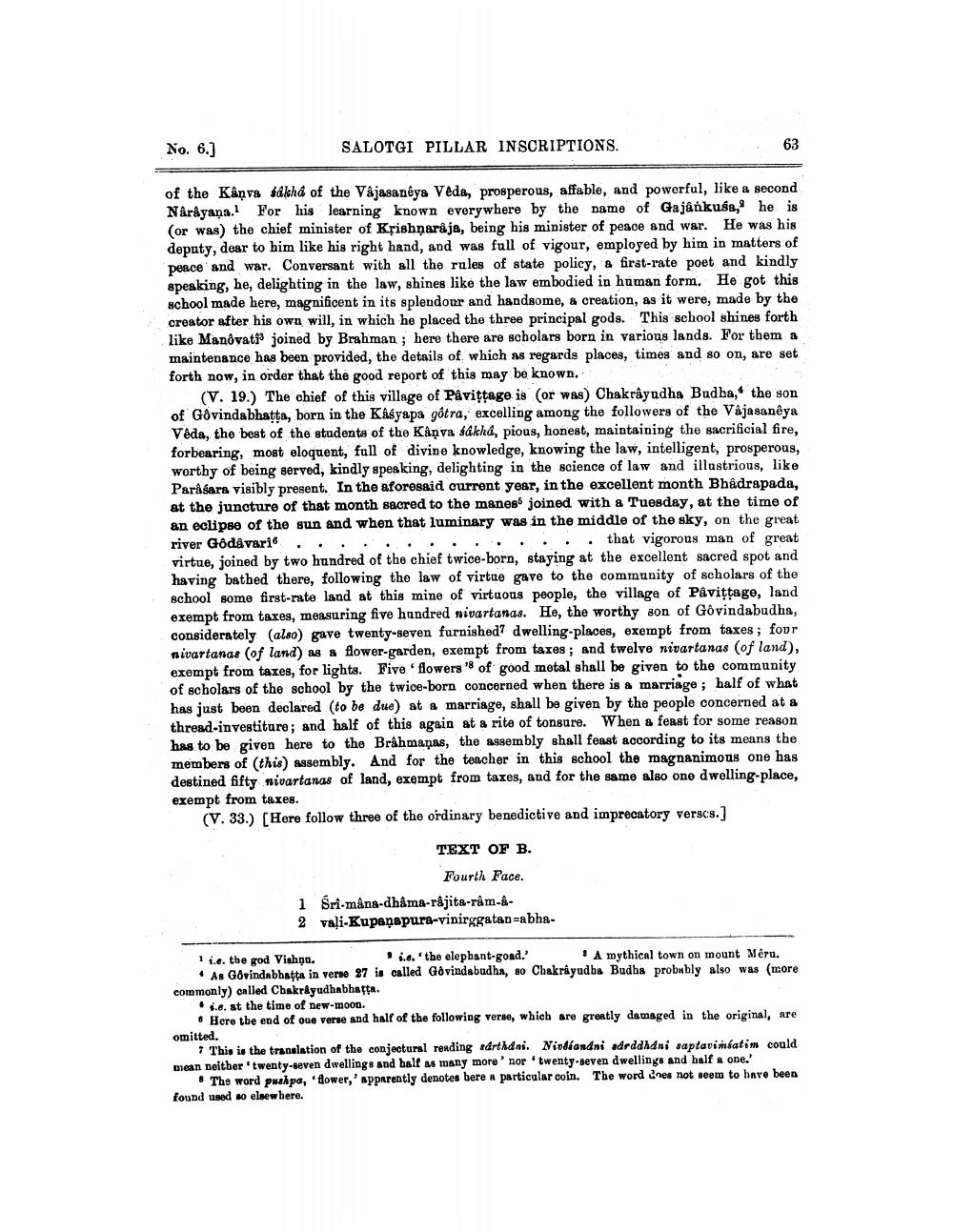________________
No. 6.]
SALOTGI PILLAR INSCRIPTIONS.
63
of the Kâņva sakha of the Vâjasaneya Veda, prosperous, affable, and powerful, like a second Narayana. For his learning known everywhere by the name of Gajánkusa, he is (or was) the chief minister of Krishnaraja, being his minister of peace and war. He was his deputy, dear to him like his right hand, and was full of vigour, employed by him in matters of peace and war. Conversant with all the rules of state policy, a first-rate poet and kindly speaking, he, delighting in the law, shines like the law embodied in human form. He got this school made here, magnificent in its splendour and handsome, & creation, as it were, made by the creator after his own will, in which he placed the three principal gods. This school shines forth like Mandvatis joined by Brahman; here there are scholars born in various lands. For them a maintenance has been provided, the details of which as regards places, times and so on, are set forth now, in order that the good report of this may be known.
(V. 19.) The chief of this village of Påvittage is (or was) Chakrayudha Budba, the son of Govindabhatta, born in the Kaśyapa gôtra, excelling among the followers of the Vâjasanêya Véda, the best of the students of the Kanva fákhd, pious, honest, maintaining the sacrificial fire, forbearing, most eloquent, full of divine knowledge, knowing the law, intelligent, prosperous, worthy of being served, kindly speaking, delighting in the science of law and illustrious, like Parâsara visibly present. In the aforesaid current year, in the excellent month Bhadrapada, at the juncture of that month sacred to the manes joined with a Tuesday, at the time of an eclipse of the sun and when that luminary was in the middle of the sky, on the great river Godavari . .. . ... .... . .. .that vigorous man of great virtue, joined by two hundred of the chief twice-born, staying at the excellent sacred spot and having bathed there, following the law of virtue gave to the community of scholars of the school some first-rate land at this mine of virtuous people, the village of Påvittage, land exempt from taxes, measuring five hundred nivartanas. He, the worthy son of Govindabudha, considerately (also) gave twenty-seven furnished? dwelling-places, exempt from taxes; four nivartanas (of land) as a flower-garden, exempt from taxes; and twelve nivartanas (of land), exempt from taxes, for lights. Five flowers "8 of good metal shall be given to the community of scholars of the school by the twice-born concerned when there is a marriage; half of what has just been declared to be due) at a marriage, shall be given by the people concerned at a thread-investiture; and half of this again at a rite of tonsure. When a feast for some reason has to be given here to the Brahmaņas, the assembly shall feast according to its means the members of this assembly. And for the teacher in this school the magnanimous one has destined fifty nivartanas of land, exempt from taxes, and for the same also ono dwelling-place, exempt from taxes.
(V. 33.) (Here follow three of the ordinary benedictive and imprecatory verscs.]
TEXT OF B.
Fourth Face. 1 Sri-mẩna-dhâmo-râjite-ram-42 vali-Kupanapura-vinirggatad=abha
1 1.e. the god Visha. i...the elephant-gond.
A mythical town on mount Meru. • As Govindabhatta in verso 87 is called Govindabudha, so Chakrayudba Budba probably also was more commonly) onlled Chakr yudhabhatta.
3.e. at the time of new-moon.
. Here the end of oue verse and half of the following verse, which are greatly damaged in the original, are omitted.
7 This is the translation of the conjectural reading sdrthdni. Niddiandni adrddhdni saptavimatim could mean neither twenty-seven dwellings and half as many more nor twenty-seven dwellings and half a one.'
The word pushpa, flower,' apparently denotes bere a particular coin. The word Gnes not seem to have been found used so elsewhere.




